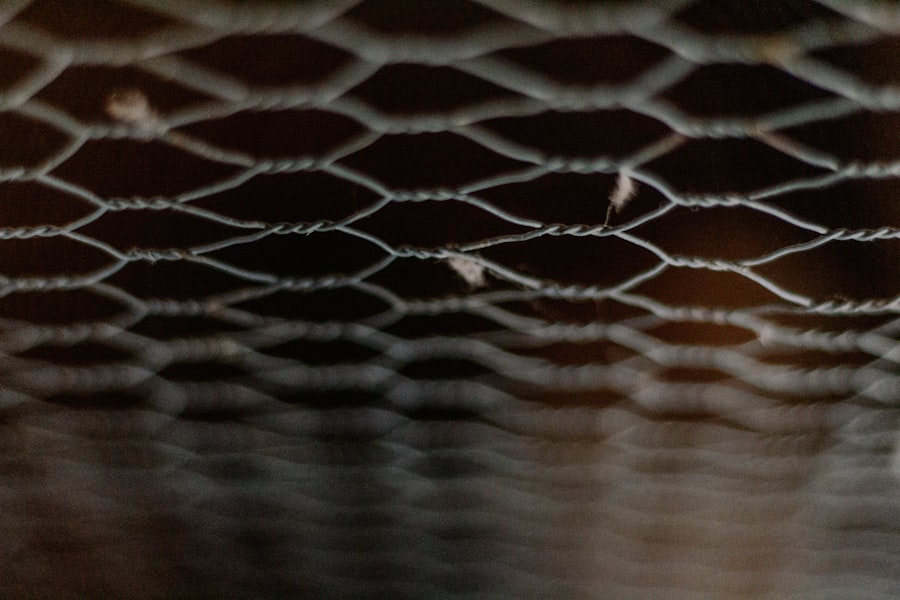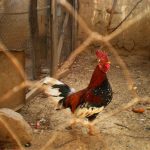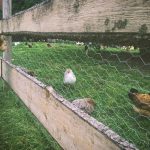Chicken-keeping can be a fulfilling hobby that provides fresh eggs and entertainment. However, chickens can become problematic when they intrude upon raised garden beds. Raised beds are a popular gardening technique that offers improved soil drainage, enhanced pest management, and easier access for planting and harvesting.
Chickens are often drawn to these beds, where they can cause considerable damage through scratching, pecking, and consuming plants. This behavior can be frustrating for gardeners who have invested time and resources in creating and maintaining their raised beds. This article will examine the factors that attract chickens to raised beds, the detrimental effects of their presence, and various strategies for deterring them from these areas.
Table of Contents
- 1 Reasons why chickens are attracted to raised beds
- 2 Negative effects of chickens in raised beds
- 3 Methods for keeping chickens out of raised beds
- 4 Natural deterrents for chickens
- 5 Physical barriers for raised beds
- 6 Conclusion and final tips for keeping chickens out of raised beds
- 7 FAQs
- 7.1 What are the benefits of keeping chickens out of raised beds?
- 7.2 How can I keep chickens out of raised beds?
- 7.3 Are there any plants that can help keep chickens out of raised beds?
- 7.4 What are some other methods for keeping chickens out of raised beds?
- 7.5 Why is it important to keep chickens out of raised beds?
Key Takeaways
- Chickens are attracted to raised beds because they provide a safe and comfortable environment for scratching, dust bathing, and foraging for insects and plants.
- Chickens can cause negative effects in raised beds such as damaging plants, spreading diseases, and leaving droppings that can contaminate the soil.
- Methods for keeping chickens out of raised beds include using chicken wire, installing motion-activated sprinklers, and creating physical barriers such as fences or covers.
- Natural deterrents for chickens include planting strong-smelling herbs like lavender and rosemary, using garlic or hot pepper spray, and placing predator decoys or reflective objects around the raised beds.
- Physical barriers for raised beds can include building a fence around the perimeter, covering the beds with netting or row covers, and using cloches or cages to protect individual plants.
Reasons why chickens are attracted to raised beds
The Allure of Raised Beds
Raised beds often contain loose, well-aerated soil that is easy for chickens to scratch and dig in, allowing them to forage for insects, worms, and other tasty treats that may be hiding in the soil. Additionally, raised beds are typically filled with nutrient-rich compost and organic matter, which can be appealing to chickens as a potential food source.
A Sense of Security and Shelter
The raised structure of the beds can provide chickens with a sense of security and shelter, making them feel safe and comfortable while they explore and peck at the plants. Furthermore, the plants themselves can be enticing to chickens, as they may see them as a potential food source or simply enjoy the act of pecking at leaves and stems.
Convenience and Elevated Surveillance
Raised beds are often located in close proximity to chicken coops or other areas where chickens are kept, making it easy for them to access the beds. The elevated structure of the beds also provides chickens with a vantage point from which they can survey their surroundings and keep an eye out for potential predators or sources of food. This combination of convenience and elevated surveillance makes raised beds an irresistible attraction for chickens.
Negative effects of chickens in raised beds

While chickens may find raised beds to be an appealing destination, their presence can have a number of negative effects on the garden. Firstly, chickens are notorious for their habit of scratching and digging in the soil, which can lead to significant damage to the plants and root systems in raised beds. This can uproot seedlings, damage delicate plants, and disturb the soil structure, leading to poor drainage and aeration.
Additionally, chickens may peck at leaves, flowers, and fruits, causing further damage to the plants in the raised beds. This can result in reduced yields and poor overall plant health. Furthermore, chickens may also leave behind droppings in the raised beds, which can introduce harmful bacteria and pathogens into the soil.
This can pose a health risk to humans who come into contact with the contaminated soil or consume produce grown in it. In addition to the direct damage caused by their foraging and pecking, chickens may also attract other pests such as rodents and insects to the raised beds. These pests can further damage plants and spread disease, creating a cascade of negative effects on the garden ecosystem.
Overall, the presence of chickens in raised beds can lead to reduced plant health, poor yields, and increased risk of disease transmission.
Methods for keeping chickens out of raised beds
There are several methods that can be employed to keep chickens out of raised beds and protect the garden from their destructive behavior. One effective approach is to create physical barriers around the raised beds that prevent chickens from accessing them. This can be achieved by installing fencing around the perimeter of the beds or using chicken wire or hardware cloth to cover the top of the beds.
These barriers should be tall enough to prevent chickens from flying or jumping over them and sturdy enough to withstand their attempts to scratch or peck through them. Another method for keeping chickens out of raised beds is to provide them with alternative sources of entertainment and foraging opportunities elsewhere in the garden. This can be done by creating designated areas for chickens to scratch and peck, such as a dedicated chicken run or a compost pile where they can search for insects and other treats.
By providing chickens with their own space to explore and forage, they may be less inclined to invade the raised beds in search of food and entertainment.
Natural deterrents for chickens
In addition to physical barriers and alternative foraging areas, there are also natural deterrents that can be used to discourage chickens from entering raised beds. One effective natural deterrent is the use of strong-smelling herbs and plants that are unappealing to chickens. For example, planting aromatic herbs like lavender, rosemary, or mint around the perimeter of the raised beds can help deter chickens from entering by masking the scent of desirable plants and making the area less attractive to them.
Another natural deterrent for chickens is the use of predator decoys or sound devices that mimic the calls of predatory birds or animals. These decoys and devices can create a sense of danger and unease for chickens, making them less likely to venture into the raised beds. Additionally, introducing natural predators such as cats or dogs into the garden area can help keep chickens at bay by creating a sense of risk and vulnerability.
Physical barriers for raised beds

Perimeter Barriers
In addition to natural deterrents, installing low fences or barriers around the perimeter of raised beds can be an effective method to keep chickens out. These barriers should be difficult for chickens to navigate or overcome, and can be made using materials such as chicken wire, hardware cloth, or plastic mesh fencing that is tall enough to prevent chickens from easily hopping over it.
Cloches and Row Covers
Another physical barrier that can be used to protect raised beds from chicken invasion is the use of cloches or row covers. These covers are placed over individual plants or entire rows, providing a physical barrier that prevents chickens from accessing the plants while still allowing sunlight and water to reach them.
Mulch and Ground Cover
Using heavy mulch or ground cover around the base of plants in raised beds can create an obstacle that makes it difficult for chickens to scratch and peck at the soil. This is a simple yet effective way to protect your plants from chicken damage.
Conclusion and final tips for keeping chickens out of raised beds
In conclusion, while chickens may find raised beds to be an attractive destination for foraging and exploration, their presence can have negative effects on the garden ecosystem. By understanding the reasons why chickens are attracted to raised beds and employing various methods for keeping them out, gardeners can protect their plants from damage and maintain a healthy garden environment. Whether through physical barriers, natural deterrents, or alternative foraging areas, there are many strategies that can be used to keep chickens out of raised beds and preserve the integrity of the garden.
In addition to these methods, it is important for gardeners to regularly monitor their garden for signs of chicken activity and take proactive measures to deter them before significant damage occurs. By staying vigilant and implementing effective strategies for keeping chickens out of raised beds, gardeners can enjoy a thriving garden without having to worry about the destructive behavior of these curious creatures.
If you’re looking for ways to keep chickens out of your raised beds, you may also be interested in learning about the ideal size for a chicken coop door. Check out this article for tips on creating a coop that keeps your chickens safe and secure.
FAQs
What are the benefits of keeping chickens out of raised beds?
Keeping chickens out of raised beds can prevent them from scratching and pecking at the plants, which can damage or destroy them. It also helps to maintain a clean and tidy garden space.
How can I keep chickens out of raised beds?
You can keep chickens out of raised beds by using physical barriers such as chicken wire or fencing around the perimeter of the beds. You can also use natural deterrents such as planting prickly or strong-smelling plants around the edges of the beds.
Are there any plants that can help keep chickens out of raised beds?
Yes, there are certain plants that chickens tend to avoid, such as lavender, rosemary, and marigolds. Planting these around the edges of raised beds can help deter chickens from entering.
What are some other methods for keeping chickens out of raised beds?
Other methods for keeping chickens out of raised beds include using motion-activated sprinklers, creating designated free-range areas for the chickens to roam, and providing them with alternative areas for scratching and foraging.
Why is it important to keep chickens out of raised beds?
Keeping chickens out of raised beds is important to protect the plants and maintain the overall health and appearance of the garden. It also helps to prevent the spread of chicken droppings, which can introduce bacteria and parasites to the garden soil.
Meet Walter, the feathered-friend fanatic of Florida! Nestled in the sunshine state, Walter struts through life with his feathered companions, clucking his way to happiness. With a coop that’s fancier than a five-star hotel, he’s the Don Juan of the chicken world. When he’s not teaching his hens to do the cha-cha, you’ll find him in a heated debate with his prized rooster, Sir Clucks-a-Lot. Walter’s poultry passion is no yolk; he’s the sunny-side-up guy you never knew you needed in your flock of friends!







